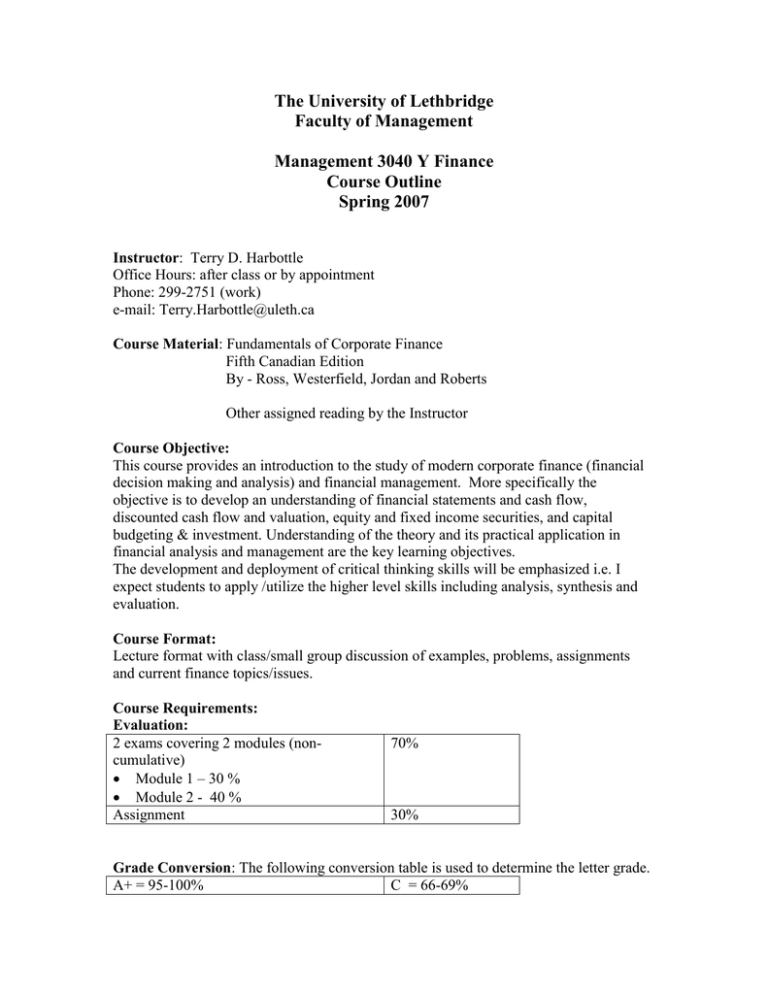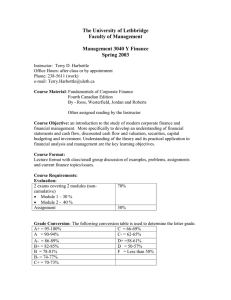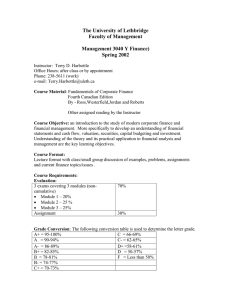The University of Lethbridge Faculty of Management Management 3040 Y Finance
advertisement

The University of Lethbridge Faculty of Management Management 3040 Y Finance Course Outline Spring 2007 Instructor: Terry D. Harbottle Office Hours: after class or by appointment Phone: 299-2751 (work) e-mail: Terry.Harbottle@uleth.ca Course Material: Fundamentals of Corporate Finance Fifth Canadian Edition By - Ross, Westerfield, Jordan and Roberts Other assigned reading by the Instructor Course Objective: This course provides an introduction to the study of modern corporate finance (financial decision making and analysis) and financial management. More specifically the objective is to develop an understanding of financial statements and cash flow, discounted cash flow and valuation, equity and fixed income securities, and capital budgeting & investment. Understanding of the theory and its practical application in financial analysis and management are the key learning objectives. The development and deployment of critical thinking skills will be emphasized i.e. I expect students to apply /utilize the higher level skills including analysis, synthesis and evaluation. Course Format: Lecture format with class/small group discussion of examples, problems, assignments and current finance topics/issues. Course Requirements: Evaluation: 2 exams covering 2 modules (noncumulative) Module 1 – 30 % Module 2 - 40 % Assignment 70% 30% Grade Conversion: The following conversion table is used to determine the letter grade. A+ = 95-100% C = 66-69% A = 90-94% A- = 86-89% B+ = 82-85% B = 78-81% B- = 74-77% C+ = 70-73% C- = 62-65% D+ =58-61% D = 50-57% F = Less than 50% Other Expectations: Students should be familiar with the University of Lethbridge regulations, policies and requirement. Refer to the University of Lethbridge Calendar. Exams: All exams are closed book with calculators and a one page (8 by 11) formulae sheet allowed. Missed exams receive a mark of zero unless the student has a legitimate reason. The instructor should be contacted beforehand for approval and to make alternative arrangements. Two exams with a total weighting of 70%. The final exam will be noncumulative. Financial Calculators – Students need to acquire and become familiar with a business calculator that is capable of handling discrete cash flows, Net Present Value(NPV) and Internal Rate of Return (IRR) Class preparation – students are expected to read the assigned chapters and other assigned readings before class. Students should have completed the assigned concept/end of chapter questions and be prepared to discuss them in class. Students are responsible for all material covered in class, the assigned chapters in the textbook and any other assigned readings. The project assignment is a group assignment and is expected to be handed in on time. Late assignments will receive zero marks: The assignment will involve a financial analysis of a publicly traded company. Students will be expected to apply their class learning of finance concepts to practical financial analysis. Full details will be provided in class. Module 1 Chapter 1 – Introduction to Corporate Finance Chapter 2 - Financial Statements, Taxes and Cash Flow Chapter 3 – Working with Financial Statements Chapter 4 – Long Term Financial Planning and Corporate Growth Chapter 5 – Introduction to Valuation Chapter 6 – Discounted Cash Flow Valuation Module 1 Exam Module 2 Chapter 7 – Interest Rates and Bond Valuation Chapter 8 – Stock Valuation Chapter 9 – Net Present Value and Other Investment Criteria Chapter 10 – Making Capital Investment Decisions Chapter 11 – Project Analysis and Evaluation Chapter 14 – Cost of Capital Module 2 & Final Exam –


